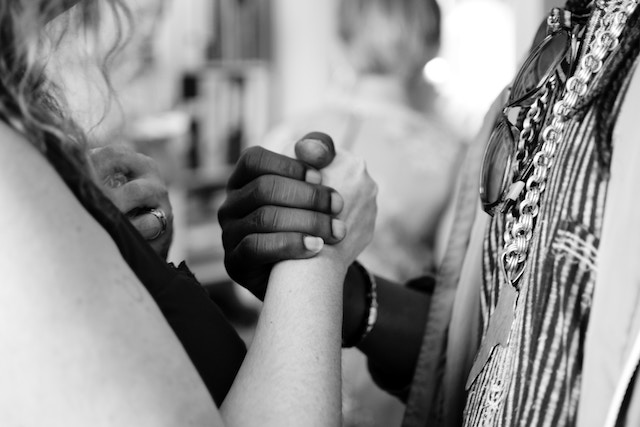How do we bridge the many divides plaguing our country today?
I don’t have all the answers, but I know a little more kindness and love can’t hurt.
A day or two before the last presidential election, I stopped at a red light behind a truck plastered in bumper stickers with not-so-subtle racist undertones. I felt my belly tighten and teeth clench as a few choice words arose in my mind.
As I opened my mouth to let them flow freely within the safety of my own car, something stopped me. The foul language characteristic of my New Jersey upbringing was replaced by a thought and question I had heard in a yoga class a few weeks earlier:
“We’re either responding from a place of love or a place in need of more love. Where do you find yourself today?”
I paused, took a breath, and quickly identified the place from which I was responding: one in need of some extra lovin’. I took another, even deeper breath and realized that maybe the person in front of me was responding from a similar place.
Maybe our political leaders were as well.
That moment has since informed the way I seek to show up in the world, particularly when responding to our exceedingly contentious political environment. Instead of reacting from a place of disgust and disregard, I try first to act from a place that recognizes our shared humanity.
I’m not saying racist ideology, Nazi propaganda, and language and actions that divide rather than unite are okay. Eradicating them is part of both short and long-term solutions. But to do that, to heal our hurting world, we must seek to understand how we arrived at this place—and that includes understanding the experiences that have shaped those we deem the enemy or “other.”
Understanding doesn’t mean we ignore the problem or the “isms”—sexism, racism, and so on; rather, that we seek to listen and relate to one another on a basic human level. We may think or act with hate, but we are not hate itself. Healing requires an ongoing commitment to viewing others as more than just our beliefs (or bumper stickers).
Of course, this becomes much more difficult when we speak in terms of heinous acts of violence and prejudice, especially when we are the targets of that violence and prejudice. Is it possible to view a serial aggressor as a human worthy of love? It’s a complicated process, but I believe it is. Isolation and “othering” help neither the afflicted nor the afflicter. If we are truly dedicated to rehabilitation and recovery from the deep-seated pain and trauma that affect us individually and collectively, real human connection must be part of the solution.
That connection might be as simple as a friendly encounter with an employee at the grocery store or a note of encouragement to a co-worker who is stressed (or causes us stress). That connection might mean introducing our children to those with varying beliefs and values to highlight the diversity of shapes, colors, religions, and systems of thought that make our world such a beautiful place.
Or, that connection might be something a bit more emotionally and psychologically trying: a conversation with a friend or family member with different political leanings or attendance at a town hall meeting to really, truly listen to the points being raised.
Transformative and compassionate communication processes, such as Marshall B. Rosenberg’s work on Nonviolent Communication (NVC), can yield incredible results on both the personal and societal levels. We’ve got to remember that life is hard, but it’s hard for all of us. “Re-humanization” demands that we step away from the computer or phone screen and listen to listen; not just to respond. Eventually, maybe the impact of these efforts will reach even the highest levels of political office.
I can’t say that my heart overflows with compassion and empathy every time I see a car covered with an image or phrase I find offensive. But each day I become slightly better at substituting a reactionary finger wave or curse word with a smile or wave—or even an “I love you”—directed toward whomever or whatever unsettled me. That doesn’t mean I suffocate my feelings or bite my tongue when encountering acts of injustice. It simply means that however I choose to speak or act, I remember that, at one point or another, we’ve all responded from a place in need of more love, and we all have the capacity to be kinder and more compassionate even during the most mundane activities.
If this Jersey Girl can infuse her driving with love, maybe our political system has a chance after all.
~
~
~
Author: Liz Getman
Image: Unsplash/Aaron Blanco Tejedor
Editor: Travis May
Copy Editor: Khara-Jade Warren









Read 0 comments and reply